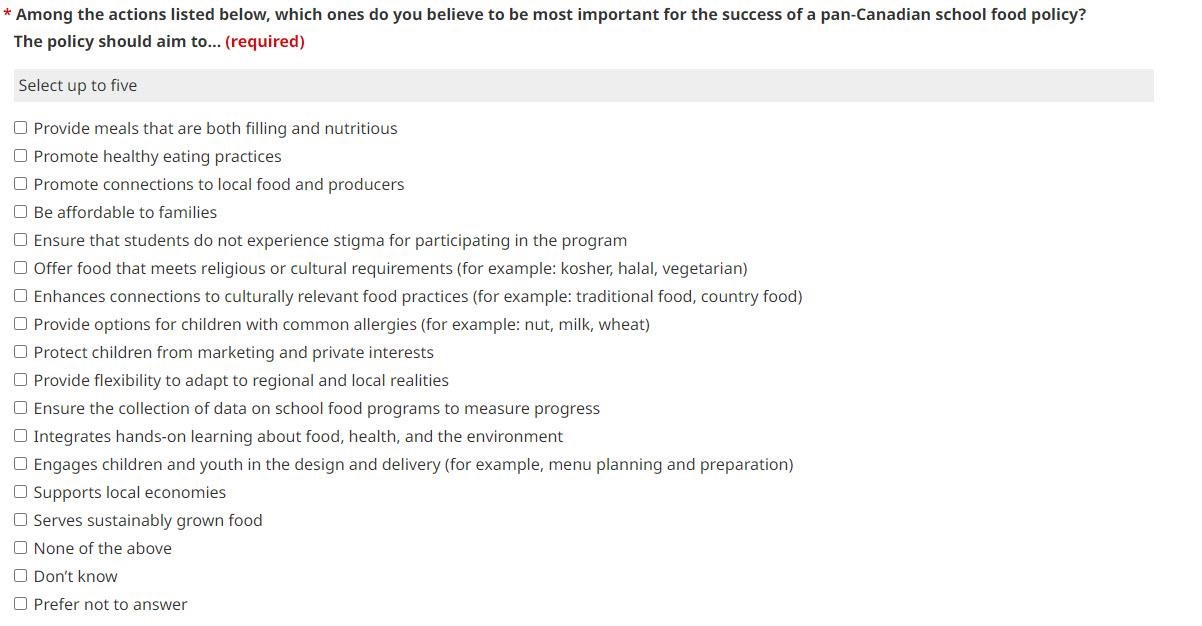One in five Canadian children are at risk of going to school hungry
By Diego Flammini
Staff Writer
Farms.com
The federal government wants Canadians to provide input about a national school food policy.
An online questionnaire is available to Canadians until Dec. 16.
The survey asks multiple questions, including what’s important for the success of a school food policy and what objectives the policy should accomplish.
A discussion paper is also available.
It outlines important background information on the benefits of school food programs.

A question from the federal government's online questionnaire about a national school food policy.
These can include supporting local farmers and sustainable food systems.
Ensuring children have access to food is an easy idea to get behind, said Karina Gould, minister of families, children and social development.
“I think (everyone) will agree that no child should go to school on an empty stomach,” she said during the Nov. 16 announcement at Carson Grove Elementary School in Gloucester, Ont. “Unfortunately, the reality in Canada is that one in five children are at risk of going to school hungry on any given day.”
The number of kids going to school hungry has increased.
Prior to the pandemic, about one million Canadian children started their school day without breakfast. That number is now more than two million, the Breakfast Club of Canada says.
Canada is behind other countries when it comes to national school food policy.
Over 388 million children in at least 161 countries receive free or subsidized school meals, according to the World Food Programme.
But Canada is not one of those countries.
“A lot of other countries are much further ahead than Canada,” said Tammara Soma, research director at Simon Fraser University’s Food Systems Lab. “Some places not only have breakfast programs, but lunch programs and snack programs too. “In Canada, this is the first time the Canadian government will be walking the talk. Usually it’s charities and organizations that have taken this kind of work on.”
Soma and her colleagues have been studying how a national ‘right to food’ strategy could benefit Canadian farmers. Her work also includes looking at how to bring a school food program to British Columbia.
A national school policy can have multiple benefits for the ag sector.
Canada loses or wastes about 35.5 million metric tonnes of food each year. This costs the economy about $49.5 billion, Second Harvest and Value Chain International reported in 2020.
Having another outlet for food will help reduce waste and support farmers, said Tammara Soma,
“Speaking to stakeholders, I know farmers are interested in finding alternative markets for their products,” she said. “School food can provide opportunities for farmers, especially if there’s a strong emphasis in supporting local food and funding local food, that can be a great solution for growers.
"You also have farmers who till some crops underground because it doesn't meet aesthetic stanards from the grocery stores, so the farmers over produce to ensure they have enough to sell. That doesn't matter in a school setting, so farmers wouldn't have to see their hard work go to waste."
The online consultations are a good start for the policy development.
But the finer details of the policy will be just as important, she said.
“We can’t have a program that creates more stigma around food insecurity,” she said. “Also, we have to look at culturally important foods because Canada is a very diverse nation and that should be reflected in any policy.”
How any national school food policy is mobilized is also important.
A streamlined approach for schools and farmers is necessary to ensure the policy’s success, Soma said.
“There needs to be a form of aggregation to help facilitate the procurement process with the schools,” she said. “Teachers don’t have the time to figure out what farmer to call or how to deal with the orders. And farmers need to know which schools are looking for which crops.”